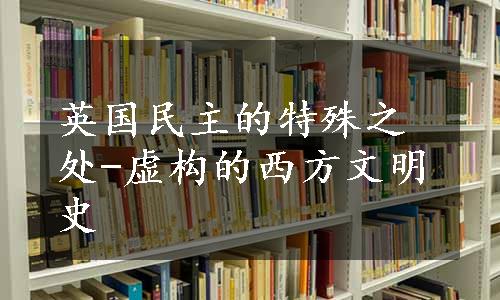
英国在欧洲启蒙运动之前经历了两场革命(1640年和1688年),乃至溯源于1215年的《大宪章》(这是一个伪造的文献)[61]。但它们都是强化贵族的特权,而与民权毫无关系,甚至是倒行逆施(只是在体制的形式上有着历史的继承性而已)。英国的这种情况正是美国和法国革命所杜绝或消灭的。黑格尔是这样评论《大宪章》的——“英格兰的贵族逼迫国王签了《大宪政》,但人民一无所得,仍然处在原来的地位。波兰的‘自由’同样地不过是贵族们的自由……全国被束缚在一种绝对的农奴制之下。”[62]关于《大宪章》是杜撰出来的,马利克(Maleiha Malik)教授写道:
《大宪章》是……法治和英国及西方的“卓异主义”的一个象征。从这个意义上讲,《大宪章》发挥着神秘的和偶像的功能。的确,如约翰·贝克爵士(Sir John Baker)……所讨论的,从1215年到16世纪后期,《大宪章》的实际影响是微不足道的。然而,《大宪章》作为故事和神秘还是很重要的。既然使用“故事”和“神秘”这样的术语,那就意味着它是假的和误导性的。[63]
类似于美国和法国革命、并受其影响的英国的民主运动,应该是轰轰烈烈的宪章运动(1836—1848年,人民宪章——普选权);它要求开放政权,打破贵族垄断。这个目标,随着英国的全球侵略和称霸海洋、而使其内部变得宽松和解,到19世纪的下半叶基本达成,它是以引进和落实中国的文官考试制度为其操作机制的(1855年局部采用,1871年扩大规模)。两位教授布朗斯坦和哈里斯所说:“一个新的文官考试制度(1871年)使几乎所有的政府部门对才俊开放。……《大学考试法案》(1871年)允许外籍教授登堂牛津和剑桥,进一步限制英国贵族垄断教育……引进的书写糊名的《秘密投票法案》(1872年),也满足了宪章派的这项要求。”[64]极为讽刺的是,英国学者格雷厄姆·沃拉斯(Graham Wallas,1858—1932年)竟说:“创造文官考试制度是19世纪的英格兰的一个伟大发明。”[65]
关于欧美引进传统中国的文官制度,英国历史学家汤因比评论道:
实际上现代英国的官吏制度,是仿照帝制中国的官吏制度而建立的。同罗马制相比较,中国的这种制度取得了很大成功。鸦片战争时,在侵略中国的英国人心目中,当时的制度是极为优越的。英国人曾考虑是否也要采用。各种议论的结果,同样在英国也确立了通过考试选拔任用行政官的制度,今天已经广泛普及。[66]
英国著名学者卡莱尔(1795—1881年)认为,此种选贤任能的政治要比宪政更有价值,如果中国的这个机制不被(英国)引进的话,“纵使宪法条文像黑莓一般的繁密,议会普及到各个乡村,那也是毫无意义的”。[67]文官考试制度之于西方,在中国思想启蒙和激发民主革命之后则起着落实民主和保驾民主的作用——它是帝国主义的时代的政治文明的中流砥柱!
【注释】
[1]Nicolas Berggruen,Nathan Gardels:Intelligent Governance for the 21st Century:A Middle Way between West and East,Hoboken,New Jersey:John Wiley & Sons,2013,p.50.
[2]Ian S.Markham:A World Religions Reader,p.124.
[3]Kostas Vlassopoulos:Unthinking the Greek Polis:Ancient Greek History beyond Eurocentrism,Cambridge UniversityPress,2007,p.15—17.
[4]Lokesh Chandra:Indian and Chinese Thought,Dialogue Quarterly Journal of Astha Bharati July-September,2011,Volume 13 No.1 www.asthabharati.org/Dia_July%20011/lok.htm
[5]Korea Newsreview,Vol.5,No.27—52,Korea News review Incorporated,1976,p.199.
[6]黑格尔:《历史哲学》,第117页。
[7]Albrecht Classen:Rural Space in the Middle Ages and Early Modern Age,Berlin:Walter de Gruyter,2012,p.731,Note 6.
[8]谢和耐:《中国社会史》,第460—461页。
[9]J.J.Clarke:Oriental Enlightenment:The Encounter Between Asian and Western Thought,Routledge,1997,p.167—169.
[10]Jerome Braun:Democratic Culture and Moral Character:A Study in Culture and Personality,Berlin:Springer Science & Business Media,2013,p.134.
[11]Ruth A Johnston:All Things Medieval:An Encyclopedia of the Medieval World,Vol.1,xiii.
[12]Christian Gerlach:Wu-Wei in Europe:A Study of Eurasian Economic Thought,London School of Economics,2005,p.4.
[13]Jacques Gernet:A History of Chinese Civilization,p.525.
[14]Colin Darch,Peter G.Underwood:Freedom of Information and the Developing World:The Citizen,the State and Models of Openness,London:Chandos Pub,2010,p.71.
[15]David Cuillier,Charles N.Davis:The Art of Access:Strategies for Acquiring Public Records,Washington,D.C.:CQ Press,2010,p.23.
[16]Colin Darch,Peter G.Underwood:Freedom of Information and the Developing World:The Citizen,the State and Models of Openness,p.71.
[17]鲁希然·支撑明代舆论独立的一些制度构架,人人网blog.renren.com/share/224428269/6277438574
[18]G Lowes Dickinson:An Essay on the Civilisations of India,China and Japan,NY:Routledgep,2011,P.14.
[19]Lokesh Chandra:Indian and Chinese Thought,Dialogue Quarterly Journal of Astha Bharati July-September,2011,Volume 13 No.1 www.asthabharati.org/Dia_July%20011/lok.htm
[20]郭齐勇:《现代新儒学的根基》,第340页。
[21]熊十力:《原儒》,中国人民大学出版社,2009,第255—256页。
[22]钱穆:《国史大纲》,香港,商务印书馆,1989,第108—109页。
[23]钱穆:《中国文化史导论》,第203—204页。
[24]《王国维学术论著》,浙江人民出版社,1998,第58页。
[25]唐君毅:《中国文化之精神价值》,台北:正中书局,1992,第278页。
[26]钱穆:《现代中国学术论衡》,第191页。
[27]《梁漱溟全集》,第三卷,第209页。
[28]牟宗三说,传统中国有“道统”,但缺少“政统”和“学统”(民主与科学)。这是误解,因为西方及现代的民主与科学都是源于中国。(牟宗三:《中国哲学的特质》,第87页)。
[29]China and Europe,1500—2000 and Beyond:What is Modern,2014.
[30]Samir Amin:Theory is History,Springer,2014,p.101.
[31]Derk Bodde:Chinese ideas in the West,American Council on Education,1948,p.2.(www.daowen.com)
[32]《梁漱溟全集》,第三卷,第153—156页。
[33]Peter F.Drucker:The New Realities,Piscataway,New Jersey:Transaction Publishers,2003,p.230—231.
[34]Author:Martin Ledstrup,Michael de Laine,Joint Committee of the Nordic Natural Science Research Councils:China has inspired us since Enlightenment,sciencenordic.com/print/616,February 12,2012.
[35][清]王之春:《清朝柔远记》,〈李序〉。
[36]Lauri Rapeli:The Conception of Citizen Knowledge in Democratic Theory,Palgrave Macmillan,2013,p.22.
[37]Henry O.Thompson:World religions in war and peace,McFarland & Company Incorporated Pub,1988,p.116.
[38]The U.S.Founders and China,foundingfathersandchina.blogspot.co.uk/2014_10_01_archive.html,01-08-2013.
[39]Elliot H.Goodwin:The New Cambridge Modern History:Volume 8,The American and French Revolutions,1763—1793,Cambridge University Press,1965,p.235.
[40]Craig A.Lockard:Societies,Networks,and Transitions:A Global History,Cengage,Learning,2015,p.364.
[41]Robert Tarbell Oliver:Communication and culture in ancient India and China,New York:Syracuse University Press,1971,p.122.
[42]Bruce Baum,Duchess Harris:Racially Writing the Republic,Duke University Press,2009,p.34.
[43]Trevor Burnard:American Revolution:Oxford Bibliographies Online Research Guide,Oxford University Press,2010,p.39.
[44]Eli Ginzberg:The Nation's Children,Volumes 1-3,Piscataway,New Jersey:Transaction Publishers,1987,p.229—230.
[45]Harold Robert Isaacs:Scratches on Our Minds:American Views of China and India,New York:M.E.Sharpe,1958,p.95—96.
[46]Nicolas Berggruen,Nathan Gardels:Intelligent Governance for the 21st Century:A Middle Way between West and East,p.48—50.
[47]Russell Freedman:Confucius:The Golden Rule,New York:Scholastic Inc,2002,p.38—40.
[48]Martin Ledstrup:China has inspired us since Enlightenment February 12,2012 sciencenordic.com/china-has-inspired-us-enlightenment
[49]Walter Isaacson:A Benjamin Franklin Reader,New York:Simon and Schuster,2005,p.323.
[50]转引自陈立夫:《中国文化概论》台湾,正中书局,1987年,第112页。
[51]Virginia Review of Asian Studies,Volume 16(2014):11—26.Dave Wang:Confucian Morality in the American.
[52]Dr.Dave Wang:From Confucius to the Great Wall:Chinese Cultural Influence on Colonial North America,https://kiss.kokushikan.ac.jp/contents/0/data/1002929/0000/registfile/ajj_006_09.pdf
[53]Joseph R.Strayer:Medieval Statecraft and Perspectives of History,Princeton University Press,1971,p.333 and p.100.
[54]Craig Lockard:Societies,Networks,and Transitions,Volume 1:To 1500,Cengage Learning,2010,p.373.
[55]John Gillingham:The English in the Twelfth Century,the Boydell Press,2000,p.13.
[56]Joseph Needham:Science and Civilisation in China:Volume 7,The Social Background,Part 2,General Conclusions and Reflections,p.20.
[57]L.J.Davis:Fleet Fire:Thomas Edison and the Pioneers of the Electric Revolution,NY:Arcade Publishing,2003,Conclusion.
[58]伊恩·莫里斯:《纬度决定历史:从地缘学角度解读历史》。
[59]杜兰特:《哲学的故事》,第76—77页。
[60][美]马汉:《海权论》,范利鸿译,陕西师范大学出版社,2007,第47页。
[61]C.R.Cheney:Magna Carta:another Canterbury-Forgery,Historical Research Volume 36,Issue 93,pages 1—26,May 1963.
[62]黑格尔:《历史哲学》,第402页。
[63]Robin Griffith-Jones,Mark Hill QC:Magna Carta,Religion and the Rule of Law,Cambridge University Press,2025,p.248.
[64]Jamie L.Bronstein,Andrew T.Harris:Empire,State,and Society:Britain Since 1830,Hobo ken,New Jersey:John Wiley & Sons,2012,p.96.
[65]Ronald Hyam:Understanding the British Empire,Cambridge University Press,20 May 2010,p.33.
[66]《展望二十一世纪——汤因比与池田大作对话录》,国际文化出版公司,1985,第265页。
[67]Thomas Carlyle:Heroes and Hero-worship,London:Chapman and Hall,1869,p.200.
免责声明:以上内容源自网络,版权归原作者所有,如有侵犯您的原创版权请告知,我们将尽快删除相关内容。







